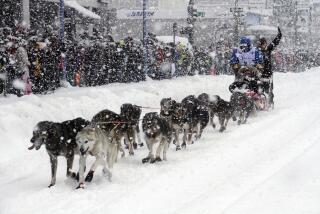Texan Gets Mushy Over Dogsledding
- Share via
WASILLA, Alaska — Randy Chappel hadn’t planned on leaving a career as an investment manager in Arlington, Texas, to run a team of sled dogs in Alaska’s most famous race.
Blame it on a tourist attraction.
Chappel and his wife were vacationing in Canada four years ago when D’Ann Chappel learned about three-hour mushing excursions. Riding in a sled driven by an experienced musher was something that the couple could never experience at home, where light snow might fall every other year or so.
“We had a really good time,” Chappel said.
Now, he is training for the Iditarod Trail Sled Dog Race, which begins March 1. Race officials say they believe that the 35-year-old rookie is the first Texan to run the 1,100-mile race to Nome since the Iditarod began in 1973.
Chappel quit his job last spring and in November moved his pregnant wife and infant son to Two Rivers so that he could train with musher Aliy Zirkle and her sister and kennel manager, Kaz Zirkle.
“He’s doing awesome,” Kaz Zirkle said as she helped Chappel with his dogs in Wasilla after a long drive from Two Rivers, about 25 miles northeast of Fairbanks in the state’s interior. They were in Wasilla for the Knik 200, one of the few races not canceled this year because of Alaska’s warm winter.
Chappel finished 10th out of a field of 30 mushers.
“It’s neat that you can show up and compete with the best in the same playing field,” Chappel said. “You can’t say that about any other sport.”
After the Canadian vacation, Chappel gushed about mushing to anyone who would listen. A secretary at work mentioned that she knew Aliy Zirkle’s grandmother, who lives in Dallas.
The Chappels decided to sponsor the musher for the 1999 Yukon Quest International Sled Dog Race, sending an initial $250 donation. Thus began a budding relationship between the couple and Aliy Zirkle, who came in fourth that year. In 2000, they followed the 1,000-mile Quest through the Internet and wasted no time when Zirkle won the race in Whitehorse, Yukon Territory.
“An hour later, we were making plane reservations to join her there,” Chappel said.
The Chappels visited Two Rivers the next winter and got to drive some of Zirkle’s dogs. Husband and wife were hooked.
Zirkle had decided to compete in her first Iditarod in 2001. This time, the Chappels chartered a plane and followed her progress in person.
“As we were flying over the trail, I thought, ‘Oh, oh, I might want to try this,’ ” Randy Chappel said.
D’Ann Chappel was enthusiastic.
“It helps that this is just temporary,” she said. “I think, OK, we can do this for a little while. I really like dog mushing myself, so I’m living vicariously through Randy.”
Zirkle agreed to be Chappel’s mentor and lease him some of her dogs. The goal was for him to run the 2003 race. After overcoming a significant learning curve, Chappel has adapted well to the job of mushing, Zirkle said.
“He’s genuinely interested in the dogs themselves,” she said. “He’s not out to be Mario Andretti, and I’m glad. I wouldn’t have taken him on if he was.”
Soon after son Trenton was born, Chappel headed north to train a few weeks for his first qualifying race, the 2002 Copper Basin 300, out of Glennallen. Until that training session, the longest distance he’d driven a team was 15 miles.
He placed 26th out of a field of 36, completing 300 miles of the required 500 to qualify for the Iditarod. That was good enough to know that he was coming back. But this time he would spend several months in Alaska. That meant quitting his job and bringing his family.
When he broke the news to folks at home, the reaction was mostly positive, although one doubting friend called the race the “Idiot-arod.”
Marshall Boyd, a friend since eighth grade, not only applauded the endeavor but got his company, a Fort Worth mortgage firm, to join a small list of Chappel sponsors. The company commissioned a logo for hats, fleece jackets, T-shirts and patches.
“In my opinion, Randy can do anything he sets his mind to,” Boyd said. “I am not surprised that he has taken on something so challenging as the Iditarod. It could have been Everest, the Peace Corps or the CIA.”
In June, Chappel spent a week in Alaska on a dog-buying spree with Zirkle, purchasing older or slower dogs from top mushers. He now owns 14 dogs and is leasing another 10 from Zirkle. He spent between $500 and $4,000 per dog -- and says his haste meant overpaying in some cases. He hasn’t added up the total cost of his adventure yet, but says it’s far more than his original $50,000 budget.
“It’s over $1,000 a month just to feed the dogs,” he said.
In this year’s Copper Basin 300, Chappel finished 18th among 44 mushers. He’s proud of that showing but concedes that he has a long way to go before he’s ready for the Iditarod. Thus his daily runs of 25 to 50 miles.
“I’ve had a pretty cushy mushing life so far,” he said. “I’m a rookie’s rookie.”
Chappel said he hasn’t decided what he’ll do after the Iditarod. The event is probably a onetime adventure, unless he does really well or really badly, he said. Financially, he could afford to do it one more year.
He admits that it would be difficult to return to many conventional jobs after spending long stretches alone with his dogs, the Alaskan wilderness and the shimmering northern lights.
“I know I should be thinking about what I’ll be doing after this, but I haven’t gotten around to it,” he said. “Life is more than a job. It’s about experiences -- and this is a really cool one.”
More to Read
Sign up for Essential California
The most important California stories and recommendations in your inbox every morning.
You may occasionally receive promotional content from the Los Angeles Times.













